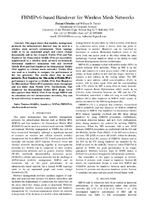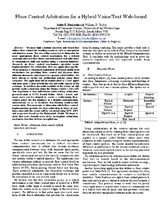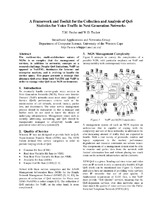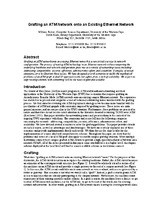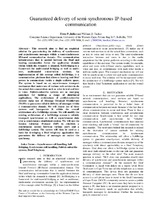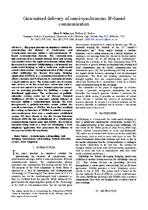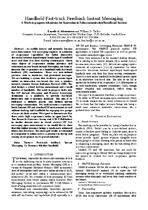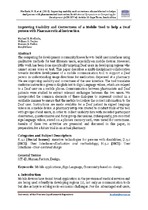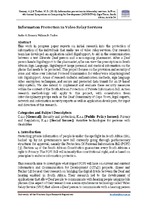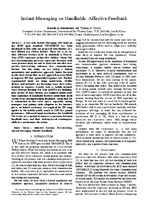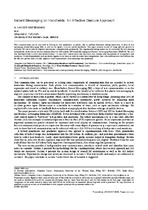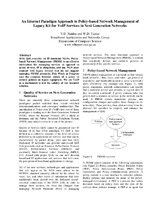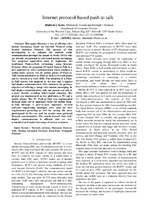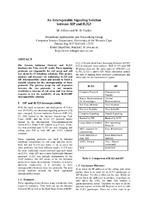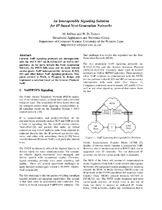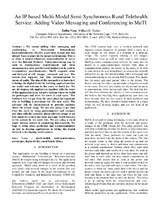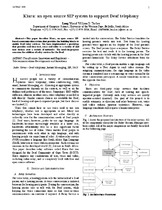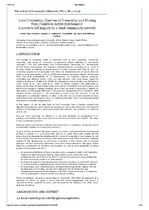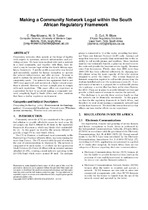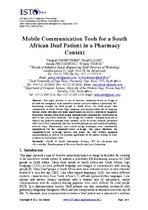Browsing Prof. William Tucker by Title
Now showing items 27-46 of 89
-
FHMIPv6-based handover for wireless mesh networks
(Telkom, 2012)This paper shows that mobility management protocols for infrastructure Internet may be used in a wireless mesh network environment. Mesh topology tends to be an unplanned graph and routes change dynamically and in this ... -
Floor control arbitration for a hybrid voice/text web-board
(Telkom, 2003)We have built a hybrid voice/text web–board that utilizes floor control for handling resources such as microphone and interface events. The aim of this research is to determine the most appropriate floor control mechanism ... -
A framework and toolkit for the collection and analysis of QoS statistics for voice traffic in Next Generation Networks
(Telkom, 2000)The multi-service, multi-architecture nature of NGNs is so complex that the management of services, in addition to networks, emerges as a research challenge. Despite QoS limitations, VoIP (as opposed to VoATM), dominates ... -
Grafting an ATM network onto an existing ethernet network
(Telkom, 1998)Grafting an ATM network onto an existing Ethernet network is a non-trivial exercise in network configuration. The process of mating ATM technology to an Ethernet network without tampering the underlying backbone and network ... -
Guaranteed delivery of semi-synchronous IP-based communication
(Telkom, 2004)This research aims to find an empirical solution for guaranteeing the delivery of synchronous and asynchronous messages within a semi-synchronous IP-based communication domain. The communication infrastructure that is ... -
Guaranteed delivery of semi-synchronous IP-based communication
(Telkom, 2005)This paper presents an empirical solution for guaranteeing the delivery of synchronous and asynchronous messages within a semi-synchronous IPbased communication domain. The communication infrastructure that is needed between ... -
Handheld fast-track feedback instant messaging
(Telkom, 2003)As mobile devices and networks become more data-centric, text messaging requires an extension of co-presence capabilities for better interactive discussion between input/output handicapped handheld users and their free ... -
Improving usability and correctness of a mobile tool to help a Deaf person with pharmaceutical instruction
(ACM, 2013)The computing for development community knows how to build user interfaces using qualitative methods for text il- literate users, especially on mobile devices. However, lit- tle work has been done speci cally targeting ... -
Information protection in video relay services
(ACM, 2013)This work in progress paper reports on initial research into the protection of information of the individuals that make use of video relay services. Our research team has developed an application called SignSupport, to aid ... -
Instant Messaging on handhelds: affective feedback
(Telkom, 2004)A text only Instant Messaging (IM) built on the IETF open standard SIP/SIMPLE has been developed in line with our proposed introduction of a user-defined text Hotkey feature. These act as an on-click Affective Gesture (AG): ... -
Instant messaging on handhelds: an affective gesture approach
(SAICSIT in association with ACM, 2005)Text communication can be perceived as lacking in chat spontaneity, or plastic, due to medium limitations during interaction. A form of text messaging, Instant Messaging (IM), is now on the uptake, even on mobile handhelds. ... -
An Internet paradigm approach to policy-based network management of legacy kit for VoIP services in Next Generation Networks
(Telkom, 2000)With QoS available on IP-dominant NGNs, Policy-based Network Management (PBNM) is an effective mechanism for managing services as opposed to actual devices. IP is ubiquitous, and any NGN must contend with legacy devices ... -
Internet protocol-based push to talk
(Telkom, 2010)This paper discusses a way of offering voice instant messaging based on Internet Protocol using Session Initiation Protocol. The purpose of this investigation is to enhance the modern social communication amongst the people ... -
An interoperable signaling solution between SIP and H.323
(Telkom, 2001)The Session Initiation Protocol and H.323 dominate the Voice over IP world. These signaling protocols are responsible for call setup and call tear down by IP telephony solutions. This project analyses and discusses the ... -
An Interoperable signaling solution for IP-based Next Generation Networks
(Telkom, 2000)Current VoIP signaling protocols are interoperable with the PSTN SS7 via H.323-to-SS7 or SIP-to-SS7 gateways. As we move toward the Next Generation Network, the PSTN falls away and we work toward carrier-grade VoIP ... -
An IP based multimodal semi-synchronous rural telehealth service: Adding video messaging and conferencing to MuTI
(Telkom, 2004)We intend adding video messaging and conferencing to Multimodal Telemedicine Intecommunicator (MuTI), a previous system that has already been in place in the target environment. This is to allow a semi-synchronous communication ... -
Kiara: an open source SIP system to support Deaf telephony
(Telkom, 2008)This paper describes Kiara, an open source SIPbased communication system that provides the building blocks to enable Deaf relay services. We have implemented a prototype that provides real-time text, voice and video to a ... -
Local ownership, exercise of ownership and moving from passive to active entitlement: a practice-led inquiry on a rural community network
(CCIRDT, 2015)In this paper, we aim to shed light on local ownership from a double practical and theoretical perspective, and examine its meaning as well as the factors that are bound to influence its development in community based ... -
Making a community network legal within the South African regulatory framework
(ACM, 2015)Community networks often operate at the fringe of legality with respect to spectrum, network infrastructure and providing services. We have been involved with such a network in a rural community, and together with them, ... -
Mobile Communication Tools for a South African Deaf patient in a pharmacy context
(IIMC International Information Management Corporation, 2012)This paper presents a case for iterative community-based co-design to facilitate the emergence of an innovative mobile system to address a potentially life-threatening scenario for Deaf people in South Africa. For Deaf ...

